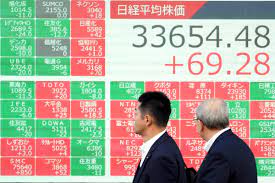
fter decades as some of the world’s most disappointing stocks, Japanese equities are suddenly lighting it up once again.
The Nikkei 225 index has surged 28% this year through Monday, roughly 10 percentage points better than the S&P 500 index of U.S. stocks and more than double the gains of markets in South Korea, France and elsewhere around the world.
While Chinese stocks are down, Hitachi, Kobe Steel and Toyota Motor are all up more than 50%.
Japanese stocks are rallying for several reasons, including a suite of reforms meant to make companies more friendly to shareholders. They’re buying back more of their own stock, for example, which sends cash to investors.
The country’s stock market has even benefited from higher inflation. For decades, the biggest worry in the world’s third-largest economy was deflation, and its central bank used unorthodox methods to try to prod prices higher.
Strategists at Goldman Sachs see many of the benefits continuing, along with an increased willingness by global stock investors to pay higher prices for each yen of profits that a company produces. They’re forecasting the Topix index of Japanese stocks to rise more in 2024 than markets in the U.S. or Europe.
But some challenges also lie ahead.
A major reason for Japan’s success has been a sharp drop in the value of the yen. It’s fallen roughly 11% against the U.S. dollar this year, as of Monday, which gives a significant boost to Japanese exporters selling to customers buying with U.S. dollars.
If the Federal Reserve really is done hiking interest rates to battle inflation, and if its next move is to cut rates as traders expect, the dollar could weaken again the yen. That would lessen the tailwind that’s pushed Japanese stocks higher through 2023. The Bank of Japan, meanwhile, is making moves to allow its bond yields to rise.
That’s helped to repress Japanese stocks a bit recently, which are no longer blowing past other countries’ markets as much as they were for most of the year, according to Ned Davis Research.





